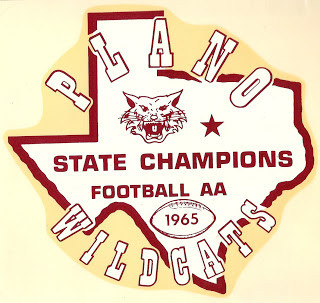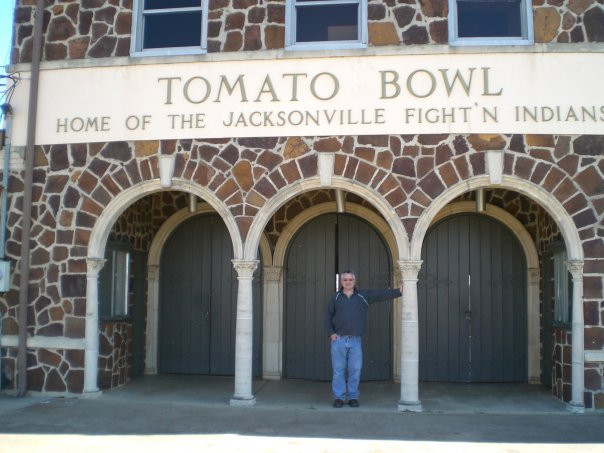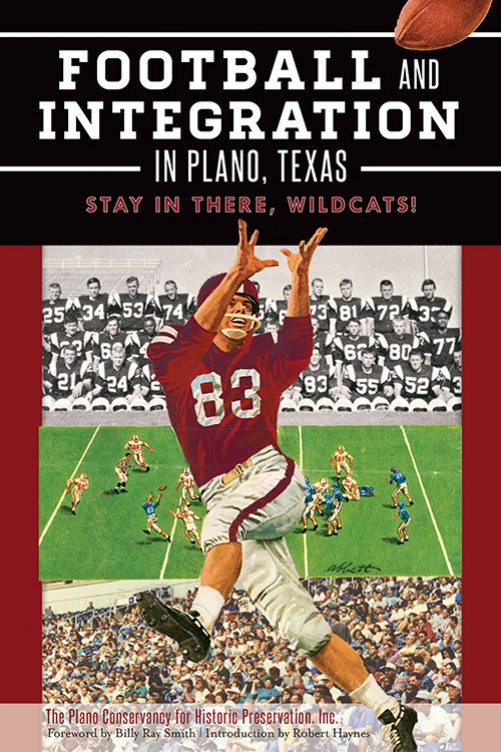Within the boundaries of Alma Drive, Legacy Drive, Spring Creek Parkway, and Central Expressway, stands a monument to Plano’s rich history and enduring spirit: John Clark Stadium. But for many newcomers and younger residents of Plano, the significance of John Clark and his profound impact on the city might be unknown. Just as Plano itself didn’t become the thriving international city it is today overnight, John Clark Stadium is more than just a name on a sports venue; it’s a testament to a man who helped build the very fabric of Plano.
In 1964, John Clark arrived at Plano High School as an assistant football coach, a pivotal year that marked the integration of the Plano School District. In a time of significant social change, football emerged as a unifying force, a common language that transcended divisions within the tight-knit community.
While the Plano Wildcats football team had yet to achieve consistent winning seasons or state championships, the arrival of head coach Tom Gray and assistant coach John Clark ignited a spark. Through dedication and a pioneering spirit, they guided the newly integrated team to an unprecedented victory, clinching the state championship in 1965. This landmark win marked the first of seven state titles for the Plano Wildcats, laying the foundation for a legacy of football excellence.
 Plano Wildcats 1965 State Championship team photo
Plano Wildcats 1965 State Championship team photo
Following the triumphant 1965 season, head coach Tom Gray accepted a position at Palo Duro High School in Amarillo. John Clark stepped up to assume head coaching duties for the Plano Wildcats in 1966. Despite a brief resignation and acceptance of a role at Henderson High School, the Plano school board, recognizing his immense value, convened a special session and persuaded Clark to remain. He accepted the dual role of Head Football Coach and Athletic Director, solidifying his commitment to Plano.
Born on January 10, 1934, in Jacksonville, East Texas, John Clark was a natural athlete from a young age. He excelled in football, basketball, baseball, and tennis. His athletic journey continued at Lon Morris Junior College in Jacksonville, where he played basketball before earning his bachelor’s degree from Baylor University, setting the stage for a career dedicated to shaping young athletes.
 Vintage football image representing Coach Clark's early passion for the sport
Vintage football image representing Coach Clark's early passion for the sport
Coach Clark began his teaching and coaching career at Amarillo High School in 1957. A significant early influence in his career was serving as an assistant to the legendary Bum Phillips, then an assistant coach for the Houston Oilers, in 1959. Before arriving in Plano in 1964, he further honed his coaching skills in Weatherford and his hometown of Jacksonville.
During the sensitive period of desegregation, Coach Clark’s leadership was instrumental in fostering an inclusive environment. He welcomed African American football players from Douglas High School into the Plano program with open arms. However, Coach Clark humbly downplayed his role, stating, “I don’t think I had a part in it… It wasn’t me; it was the players themselves. They expected a lot out of each other. My job was easy.” James Thomas, a player who transferred from Douglas to Plano, offered a different perspective, emphasizing the trust and respect the African American community held for Coach Clark, stating, “In our neighborhood, the African American neighborhood knew and trusted and believed in Coach Clark, and we were taught that. They knew and respected him.”
Over ten seasons as the Wildcats’ Head Coach, John Clark built an impressive legacy. Plano achieved two state championships and nine district championships under his leadership. His overall record stood at an astounding 107 wins and only 17 losses. Fittingly, his first state championship victory in 1967, a 27-8 win over San Antonio Randolph, took place at Baylor Stadium in Waco, his alma mater’s home ground. Showing his characteristic dedication, Coach Clark taught his Sunday school class the very day after winning the state title. His second state championship came in 1971, a hard-fought 21-20 victory against Gregory-Portland at Memorial Stadium on the University of Texas campus in Austin. Furthermore, he led Plano to two undefeated regular seasons in 1974 and 1975, further cementing his coaching prowess, although state championship eluded them in those years, losing in the quarterfinals and bi-district rounds respectively.
After an illustrious decade as head coach, Coach Clark transitioned to the role of Plano ISD Athletic Director for the next seventeen years, continuing to shape Plano athletics from a broader perspective. In 1977, a new era began for Plano Wildcats football with the inaugural season at John Clark Field, later to be known as John Clark Stadium. The Wildcats marked the stadium’s opening in spectacular fashion, securing the school’s fourth state championship that very season. During his tenure as Athletic Director, the Wildcats added three more state championships to their tally, a testament to the enduring culture of excellence he instilled.
 Coach John Clark in a portrait showcasing his leadership and dedication to Plano athletics
Coach John Clark in a portrait showcasing his leadership and dedication to Plano athletics
John Clark’s contributions have been widely recognized. He was the inaugural inductee into the Plano Athletics Hall of Honor and is also a member of the Texas High School Coaches Association Hall of Honor, the Texas High School Athletic Directors’ Hall of Honor, and the Texas Sports High School Football Hall of Fame.
The impact of Coach Clark extended beyond wins and championships, deeply influencing those who played for him. Coach Tom Kimbrough stated, “John Clark was very inspirational and was my role model… Any success I had; I share with him because he taught me everything I know. He was so instrumental in whatever success I’ve had over the years.”
Actor Brad Leland Williams, known for his role in “Friday Night Lights,” and a former Plano Wildcat under Coach Clark, shared a poignant story. After a career-ending knee injury, Coach Clark encouraged Williams to pursue his other passion, acting, demonstrating his care for his players’ futures beyond the football field. Former player Ronny Hart emphasized Coach Clark’s ability to motivate and inspire, saying, “Coach Clark made everything roll. He was able to bring out the best in you. He expected the best in you. Everybody respects Coach Clark!”
In 2004, a project to document the story of Coach Clark and the 1965 team culminated in the book, “Football and Integration In Plano, Texas.” Interviews with Coach Clark and players revealed the lasting respect and admiration they held for him, even decades later.
 Book cover of "Football and Integration in Plano, Texas" featuring the Plano Wildcats
Book cover of "Football and Integration in Plano, Texas" featuring the Plano Wildcats
The passing of Coach John Clark marked a somber moment for Plano and the entire state of Texas. John Clark Stadium stands not just as a venue for athletic competition, but as a lasting memorial to a man who profoundly shaped Plano. His greatest legacy lies in the positive influence he had on generations of young men. John Clark Stadium is a tribute to his leadership, his integrity, and his enduring contribution to the Plano community.
